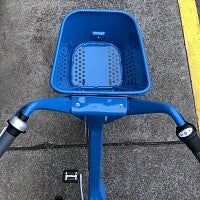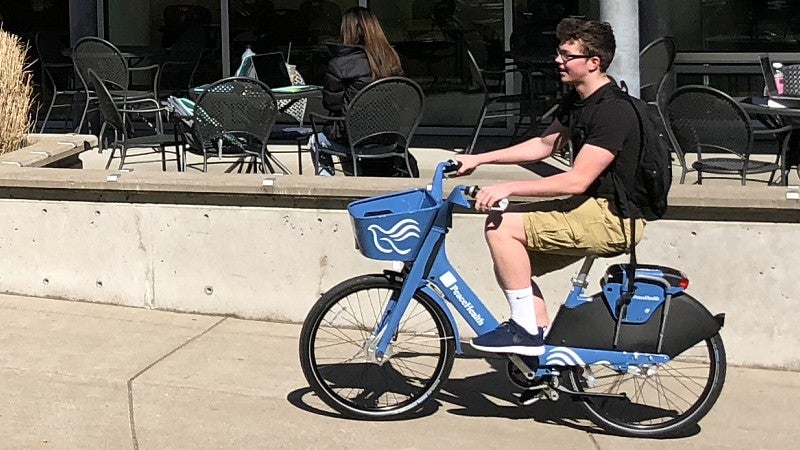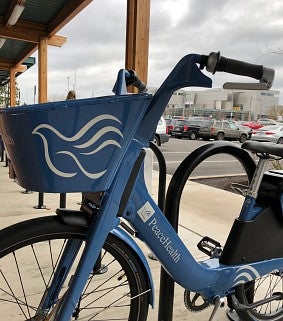Eugene’s new bicycle-sharing system is ready to get rolling.
The system connects the UO campus to downtown Eugene and the Whiteaker neighborhood and offers discounts for UO students, staff and faculty. And, organizers say, it’s easy to use.
To be known as PeaceHealth Rides, the bike-share system will have a UO campus launch Tuesday, April 24, from 11 a.m. to 1 p.m. in front of the Erb Memorial Union. The event will include a ribbon cutting, free giveaways and bike share experts to answer questions. People are invited to give the new bikes a spin and to sign up for the system.

“It’s basically like taking the bus,” said Kelsey Moore, UO Bike Program coordinator. “You generally use it for short trips. Say you take the bus downtown, and then you just want to get some exercise and be outside or just ride a bike for fun, so you hop on a bike and come back.”
People can sign up online or at any station with a kiosk. After registering with a payment method, users can borrow a bike by entering their membership number and PIN into the keypad on the back of the bike. UO students can sync their memberships with their student ID cards, accessing the bikes with a scan and a PIN.
An informational video demonstrates how to use the bikes. After entering their PIN, users simply pull off and holster a u-shaped lock and start riding.
UO students, faculty and staff get 15 minutes a day of free riding and then pay 10 cents per minute. Memberships, which give users one hour of free riding per day, cost $5 a month for Ducks. The general community pays $15.

“This gives the opportunity for someone who maybe doesn’t want to own their own bike on campus yet — maybe a student who is living on campus and would ride occasionally but not all the time. I It gives them bike access without having ownership,” Moore said. “Right now a lot of people bring their bikes to campus because they want to ride sometimes, but there’s not secure bike parking for most of the dorms. People end up parking their bikes out in the elements and sometimes there’s security concern if they’re there for long periods of time.”
Students can use the bikes to travel quickly from one end of campus to the other. They can also use the system to travel all around central Eugene.

The idea for bike share in Eugene originated at the UO, starting at the Bike Program and the Associated Students of the University of Oregon, the UO’s student government.
“The UO community is integral to the success of the system,” said Lindsey Hayward, the general manager of PeaceHealth Rides. “The idea was really founded by students, and I think what’s really exciting is we’re able to build on that.”
PeaceHealth Rides uses bicycles from Social Bikes, the same company that provides Portland’s BikeTown system. Eugene’s 300 bikes feature an open frame with a basket and bell.
The system is named for its title sponsor, a nonprofit health care provider that owns and operates hospitals around the Pacific Northwest, including in Eugene. PeaceHealth has committed to a total donation of $900,000 spread over three years. ASUO contributed $197,311, and the remainder of the funding came from the city of Eugene through a grant from the Oregon Transportation Commission.
Before the April 24 campus-specific launch, PeaceHealth Rides will have a city launch April 19.
—By Sarah Eddy, University Communications


